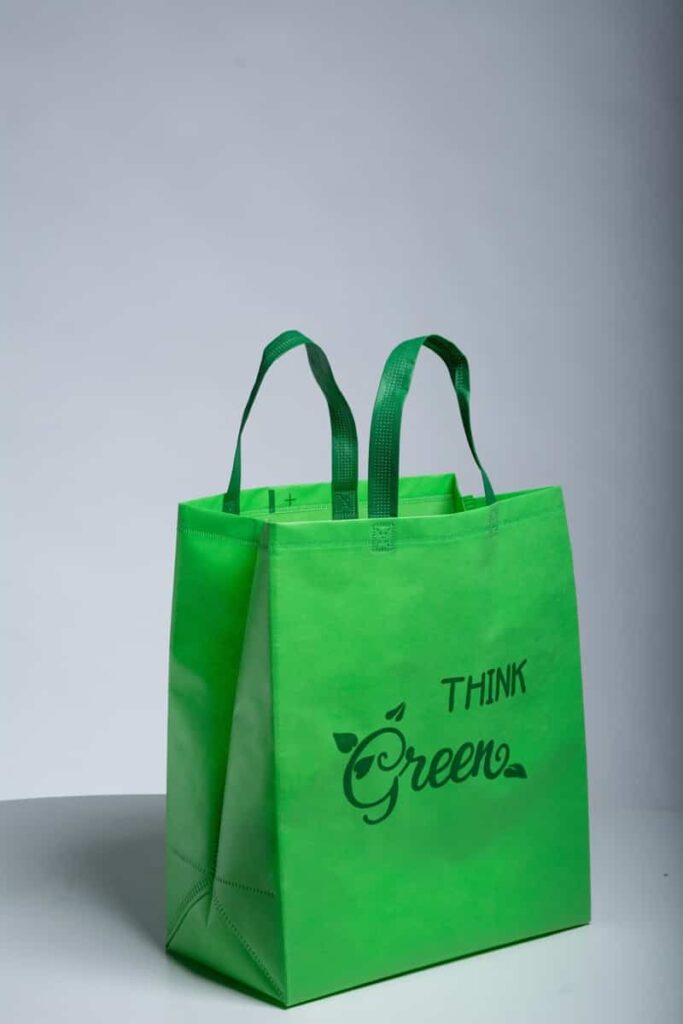Starting a non-woven bag business in India is a great way to start in the manufacturing industry. Non-woven bags are made from various materials, including polypropylene, polyester, and nylon. They are strong, durable, and can be used for multiple purposes, making them an excellent option for businesses of all sizes.

When starting a non-woven bag business in India, you need to consider several things, including the cost of machines, the price of raw materials, and the amount of profit you can expect to make. You will also need to obtain a business license and register your business with the government.
How to start a non-woven bag business in India
How are non-woven bags made?
Non-woven bags are usually made from two types of material: polypropylene or polyethylene. Polypropylene is a plastic that is derived from petroleum, and it is the most common type of non-woven fabric. Polyethylene is another type of plastic that is derived from natural gas. It is less common than polypropylene, but it is sometimes used to make non-woven bags because it is stronger and more durable.
The manufacturing process for non-woven bags begins with a roll of plastic material. Next, the plastic material is fed into a machine that uses heated rollers to weld the edges of the material together. The welded edges are then cut to create individual bags. Once the bags are cut, they can be printed with designs or logos using various printing methods.
In case you missed it: Tea Bag Project Report, Manufacturing Plan

The market for non-woven bags in India
The market for non-woven bags in India is growing rapidly. Non-woven bags are an eco-friendly and durable alternative to plastic bags and their use is encouraged by the Indian government. According to a report by Allied Market Research, the non-woven bags market in India is expected to grow from $0.64 billion in 2016 to $1.19 billion by 2022, at a CAGR of 11.4%.
There are many reasons for the increasing popularity of non-woven bags in India. One is the rising awareness of the environmental problems caused by plastic bags. Non-woven bags are made from polypropylene, a recyclable material that does not pollute the environment like plastic. In addition, non-woven bags are strong and durable, so that they can be reused many times. Another reason for the growing popularity of non-woven bags in India is the government’s support for their use.
The Indian government has issued an order stating that all retailers must provide shoppers with the option of using reusable bags made from cloth or other materials instead of plastic bags. This order has led to increased demand for non-woven bags from retailers. In addition, the increasing number of shopping malls and supermarkets in India also drives the market for non-woven bags. These establishments must provide shoppers with reusable bags, and they often prefer non-woven bags because they are more durable than plastic ones.
In case you missed it: Paper Bags Project Report, Business Plan

License to start a non-woven bag business in India
To start a non-woven bag business in India, you must obtain a license from the concerned authorities. The process of getting a license may vary from state to state. However, generally, you will need to apply along with the required documents to the local authority. Once your application for non-woven business is approved, you will be issued a license. It is important to note that you will need to renew your license yearly.
In addition, you will also need to comply with the various rules and regulations related to non-woven bag businesses in India. Once the license is obtained, the next step is to purchase a non-woven bag-making machine. These machines are readily available and can be bought from any reputed dealer. The cost of these machines ranges from Rs 2 lakhs to Rs 5 lakhs depending on the features and capabilities.
How to start a non-woven bag business in India
Starting a non-woven bag business in India is a lucrative opportunity as the country has a massive demand for these bags. Non-woven bags are made from polypropylene, a durable and strong material. These bags are eco-friendly and can be reused multiple times. They are also affordable and lightweight, making them a popular choice among consumers. There is a growing awareness of the harmful effects of plastic on the environment. This has resulted in many Indian states banning the use of plastic bags.
As an alternative, people are now using non-woven bags, which are not only eco-friendly but also stylish. This presents an excellent opportunity for entrepreneurs to start a non-woven bag business in India. The first step is to develop a business plan. This should include your target market, investment budget, and marketing strategy. It is also important to research the competition and understand the current scenario of the non-woven bag market in India.
Once you have finalized your business plan, the next step is to procure the required machinery. The cost of setting up a non-woven bag manufacturing unit varies depending on the capacity and scale of production. However, it is generally around Rs 10 lakhs. Additionally, you will need to purchase raw materials such as polypropylene sheets and thread for stitching the bags. The average selling price of non-woven bags in India ranges from Rs 2 to 5 per piece.
In case you missed it: School Bag Project Report, Business Plan
The business plan for a non-woven bag business in India
Starting a non-woven bag business in India is a great way to help the environment and make a profit. There is couple of factors to consider when creating a business plan for this type of business. The first step is to research the market and determine what types of bags are in demand. Next, you need to determine the production costs for these bags. This includes the cost of the materials, the machine cost, and the labor costs.
Once you have an accurate estimate of the production costs, you can price your bags accordingly and start marketing your business. It is also important to consider the competition when creating a business plan for a non-woven bag business in India. Many other businesses produce similar products. Therefore, you need to be able to differentiate your products from others to succeed. The best way to do this is by offering a wide range of colors, sizes, and designs. You can also offer custom options for your clients.
This will give them the incentive to choose your bags over others. Another important aspect of starting a non-woven bag business in India is to find out about government subsidies and incentives. The Indian government offers many programs to help reduce the cost of starting a business. These programs can help with the machine, labor, and other start-up expenses. By taking advantage of these programs, you can significantly reduce overhead costs and increase your chances of success.
The machine cost for a non-woven bag business in India
The machine cost for a non-woven bag business in India will vary depending on the type of machines you need and the number of machines you need. A single non-woven bag-making machine costs around Rs. 15 to 20 lakhs. For a complete set of machines, the cost will be around Rs. 30-35 lakhs. Therefore, the machinery cost will be the most significant initial investment for starting this business. You will also need to factor in the cost of raw materials, which will be your second most considerable expense after the machinery.
Raw materials for making non-woven bags include polypropylene, the main fabric used; adhesive; and thread. A rough estimate for the cost of raw materials would be Rs. 10-12 per kg of the finished product. Finally, you will need to factor in other miscellaneous costs, such as packaging, shipping, and marketing expenses. These will vary depending on your specific business plan but should be factored into your budget for starting this business.
In case you missed it: Paper Bag Project Report – Making Plan
The profit potential for a non-woven bag business in India
There is a vast potential for profit in starting a non-woven bag business in India. The market for non-woven bags is growing rapidly, and there is a tremendous unmet demand for these products. Non-woven bags are an eco-friendly and cost-effective alternative to plastic bags and their popularity is increasing as people become more aware of the environmental impact of plastic.
The machine cost for a non-woven bag business in India is relatively low, and numerous government subsidies can further reduce the business’s cost. The profit potential is high, as non-woven bags command a premium price due to their unique properties and benefits. With a well-executed business plan, a non-woven bag business can be highly profitable and provide a substantial return on investment.
The subsidy available for a non-woven bag business in India
The subsidy available for a non-woven bag business in India is very attractive. There are two main types of subsidies: direct and indirect. Direct subsidies are given directly by the government to the business, while indirect subsidies are given indirectly through tax breaks or other means. The Indian government offers a wide range of subsidies for businesses, including non-woven bag businesses. Some of the most popular subsidies include:
- The Pradhan Mantri Mudra Yojana (PMMY) Scheme: This scheme offers loans of up to Rs 10 lakh to small businesses, including non-woven bag businesses. The interest rate on these loans is only 5%, making them very affordable.
- The Prime Minister’s Employment Generation Programme (PMEGP): This scheme provides loans of up to Rs 25 lakh to small businesses, including non-woven bag businesses, to create new jobs. The interest rate on these loans is only 3%, making them very affordable.
- The Micro Units Development and Refinance Agency Ltd (MUDRA) Scheme: This scheme provides loans of up to Rs 10 lakh to small businesses, including non-woven bag businesses, for working capital needs. The interest rate on these loans is only 7%, making them very affordable.
- The Credit Linked Capital Subsidy Scheme (CLCSS): This scheme provides subsidies on term loan interest rates for eligible small businesses, including non-woven bag businesses.
In case you missed it: Jute Bag Manufacturing Project Report – Business Plan
Conclusion
Starting a non-woven bag business in India can be a profitable venture. With the right business plan and machine cost, you can profit and get a subsidy from the government. We hope this blog post has helped you figure out how to start your own non-woven bag business in India.
- Handicraft Making at Home: A Small Profitable Business Idea
- Pet-Tech Startups: Innovations for Animal Lovers
- Tech Repair Services: Meeting the Demand for Gadget Maintenance
- Maximizing Rewards: Smart Credit Card Habits for Cashback and Points
- Ultimate Guide to Making Money from Goat Milk Business
- How to Start an Agricultural Value Added Product Business
- Value-Added Business Ideas for Greenhouse: The Best Ways to Make Profits with Greenhouse Farming
- How to Make Profits with Organic Country Chicken: Best Strategies for Beginners
- 10 Value-added Business Ideas for Millets: Low-investment and Highly Profitable
- Why Cleaning Service Business Becoming More Profitable in Metro Cities in India
- 10 Best Businesses to Start in Ayodhya for Profits
- Top Drone Business Ideas in India: Unlocking Aerial Innovation & Opportunities
- Top 10 Service Businesses You Can Start with No Money
- Ultimate Guide to Starting a Home-Based Advertising Agency Business
- Starting a Nail Salon Near Your Location: Check List, Business Plan, Licensing, and Opening Instructions
- Construction Company Name Ideas: Guide to Create New Construction Company Names
- 8 Best Small Businesses to Start in Hyderabad: Low-Cost and Profitable
- 10 Best Small Businesses to Start in Massachusetts: Low-Cost and Profitable
- 10 Best Small Businesses to Start in Maryland: Low-Investment and Profitable
- 10 Best Small Businesses to Start in Delaware: Low-Investment and Profitable
- 10 Best Small Businesses to Start in Connecticut: Low-Investment and Profitable
- Top 10 Best Online Pet Business Ideas: Exploring Cats to Dogs
- 10 Best Small Businesses to Start in Colorado: Low-Investment and Profitable
- Top 10 Profitable Small Business Ideas in California: Low-Investment Tips
- From Little Rock to Fayetteville: Top 10 Profitable Small Business Ideas in Arkansas
- Top 10 Profitable Small Business Ideas in Alabama: Discover Opportunities in Alabama’s Growing Cities
- Top 10 Profitable Small Business Ideas in Arizona: Discover Opportunities in Arizona’s Growing Cities
- Golf Business Ideas: Exploring Golf Course Money Making Ideas
- Low Capital Profitable Small Farm Ideas: Farming Ideas to Make Money
- How to Write a Business Plan for Daycare: Exploring from Financial Projections to Risk Management
- Home Daycare License Requirements: Exploring State-wise In-home Daycare Requirements
- How Profitable is Day Care Business: How Much Does a Daycare Owner Make a Month or Year?
- How to Open a Daycare Center in Toronto, Canada: Business Plan, Licenses and Permits
- How to Start Meal Prep and Delivery Services: A Popular Business Idea
- How to Start a Milk Chilling Plant Business
- How to Start Coconut Shell Charcoal Business: Business Plan for Maximizing Profits


